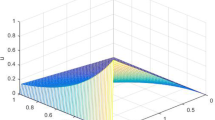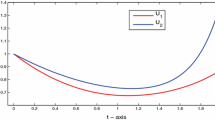Abstract
In this paper we design two numerical schemes for solving a class of time dependent singularly perturbed parabolic convection–diffusion problems with general shift arguments in the reaction term. The discretization in both the directions is based on finite difference scheme. Special type of mesh and interpolation is used to tackle the terms containing shifts. The earlier numerical schemes for the considered problem are restricted to the case of small delay and advance arguments while in practical situations these shift arguments can be of arbitrary size (i.e., may be big or small enough in size). In this paper we propose two numerical schemes which work in both the situations i.e., when shifts are big or small enough in size. An extensive amount of analysis is presented to show the linear convergence in space and time of both the schemes. Some numerical results are given to confirm the predicted theory and to show the effect of shifts on the solution.






Similar content being viewed by others
References
Ansari, A., Bakr, S., Shishkin, G.: A parameter-robust finite difference method for singularly perturbed delay parabolic partial differential equations. J. Comput. Appl. Math. 205(1), 552–566 (2007)
Bashier, E., Patidar, K.: A second-order fitted operator finite difference method for a singularly perturbed delay parabolic partial differential equation. J. Differ. Equ. Appl. 17(05), 779–794 (2011)
Bashier, E., Patidar, K.C.: An almost second order fitted mesh numerical method for a singularly perturbed delay parabolic partial differential equation. Neural Parallel Sci. Comput. 18(2), 137–154 (2010)
Bashier, E.B., Patidar, K.C.: A novel fitted operator finite difference method for a singularly perturbed delay parabolic partial differential equation. Appl. Math. Comput. 217(9), 4728–4739 (2011)
Clavero, C., Jorge, J., Lisbona, F.: A uniformly convergent scheme on a nonuniform mesh for convection–diffusion parabolic problems. J. Comput. Appl. Math. 154(2), 415–429 (2003)
Farrell, P., Hegarty, A.: On the determination of the order of uniform convergence. In: Proceedings of the 13th IMACS World Congress on Computational and Applied Mathematics (IMACS, 1991), pp. 501–502 (1991)
Kaushik, A., Sharma, K., Sharma, M.: A parameter uniform difference scheme for parabolic partial differential equation with a retarded argument. Appl. Math. Modell. 34(12), 4232–4242 (2010)
Kellogg, R.B., Tsan, A.: Analysis of some difference approximations for a singular perturbation problem without turning points. Math. Comput. 32(144), 1025–1039 (1978)
Kumar, D., Kadalbajoo, M.K.: A parameter-uniform numerical method for time-dependent singularly perturbed differential-difference equations. Appl. Math. Model. 35(6), 2805–2819 (2011)
Ladyzhenskaia, O.A., Solonnikov, V.A., Ural’ceva, N.N.: Linear and Quasi-Linear Equations of Parabolic type, vol. 23. American Mathematical Society, Providence (1988)
Miller, J.J.H., O’Riordan, E., Shishkin, G.I.: Fitted Numerical Methods for Singular Perturbation Problems: Error Estimates in the Maximum Norm for Linear Problems in One and Two Dimensions. World Scientific Publishing Co. Inc., River Edge (1996)
Musila, M., Lánskỳ, P.: Generalized stein’s model for anatomically complex neurons. Biosystems 25(3), 179–191 (1991)
Ramesh, V., Kadalbajoo, M.K.: Upwind and midpoint upwind difference methods for time-dependent differential difference equations with layer behavior. Appl. Math. Comput. 202(2), 453–471 (2008)
Roos, H.G., Stynes, M., Tobiska, L.: Robust Numerical Methods for Singularly Perturbed Differential Equations: Convection–Diffusion-Reaction and Flow Problems, vol. 24. Springer, Berlin (2008)
Acknowledgments
The work of the first author was supported by U.G.C. (Letter No. F.17-7(J)/08(SA-1) dated 01-Feb-2012) New Delhi, India. The work of the second author was supported by the Research and Development grant scheme 2014–2015 of University of Delhi, Delhi under Grant No. RC/2014/6820.
Author information
Authors and Affiliations
Corresponding author
Rights and permissions
About this article
Cite this article
Bansal, K., Rai, P. & Sharma, K.K. Numerical Treatment for the Class of Time Dependent Singularly Perturbed Parabolic Problems with General Shift Arguments. Differ Equ Dyn Syst 25, 327–346 (2017). https://doi.org/10.1007/s12591-015-0265-7
Published:
Issue Date:
DOI: https://doi.org/10.1007/s12591-015-0265-7
Keywords
- Singular perturbation
- Differential–difference equations
- Convection–diffusion parabolic problem
- Interpolation
- Finite difference scheme




